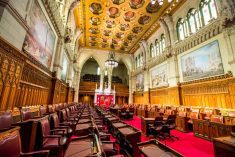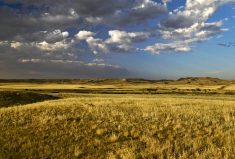“Ten years is a long time out there and a lot of deforestation will have occurred by then.”
– TOM LOVEJOY, HEINZ CENTER FOR SCIENCE AND THE ENVIRONMENT
With its bold pledge to halve the rate of Amazon deforestation, Brazil wants to boost its international environmental credentials. But it may lack the conviction and resources to reach its goal.
The plan, announced Dec. 1 ahead of a major United Nations climate conference in Poland, is the first time Brazil has adopted a target for deforestation after years of putting the onus on rich nations to help stop global warming.
Read Also

Trade uncertainty, tariffs weigh on Canadian beef sector as market access shifts
Manitoba’s beef cattle producers heard more about the growing uncertainty they face as U.S. tariffs, and shifting trade opportunities, reshape their market.
Environmentalists stress that is an important step forward from a few years ago when Brazil would barely discuss Amazon deforestation with other countries.
But while the target of halving the current rate of destruction by 2018 looks good on paper, critics say the plan lacks details and contains ambiguous language that gives the government leeway to miss the targets.
As well as strong commitment from a government that has often been reluctant to take on farming and development interests, success appears to depend on continued foreign donations to a fund that so far has only received pledges from Norway.
“It’s important that they have an actual goal, but it’s going to come down as always to whether there’s sustained political will,” said Tom Lovejoy, biodiversity chair at the Heinz Center for science and the environment in Washington.
It is unclear whether President Luiz Inacio Lula da Silva, a former union leader often more concerned with jobs than trees, will put up the political capital the plan needs as he faces growing fallout from the global financial crisis.
Under the plan, which calls for a reduction in deforestation to an annual 5,850 sq. km by 2018, Lula is not obliged to make any deforestation cuts in his two remaining years in office.
“They are setting targets for the next government. I’m not sure how convinced Lula is of this,” said Rubens Born, executive director with Vitae Civilis, a group defending the environment and peace.
“Schizophrenic”
Environmentalists are increasingly worried about a “tipping point” that could have a drastic impact on the regional climate and agriculture. It refers to a time when the forest’s own destruction disrupts the cycle of rainfall and triggers irreversible desertification.
“Ten years is a long time out there and a lot of deforestation will have occurred by then and I really do worry about thresholds being passed,” Lovejoy said.
Alarmed by a spike in deforestation last year, Brazil has made some progress in cracking down on illegal loggers, launching several high-profile operations this year to confiscate timber, beef and soy from illegally cleared areas.
It also cut credits to proprietors without proper land titles, increasingly uses satellite surveillance technology and plans to create a 3,000-strong environmental police force.
Still, the vastness of the Amazon means enforcement is only part of the solution. Environmentalists say the only long-term option is to change the economics of deforestation by encouraging sustainable industries such as latex and nuts.
The government’s plan calls for a massive increase in planting sugarcane and other biofuel crops, which critics say push farmers and ranchers deeper into the Amazon.
It also calls for more hydroelectric plants, which have attracted settlers and land speculators.
“The Brazilian government is schizophrenic. It wants conservation but then promotes such projects,” said Claudio Maretti, head of regional conservation programs at WWF-Brazil.
The plan’s financing is also uncertain, depending on the “availability” of domestic and international funds, according to the official document.
Norway this year pledged $1 billion over seven years to a new Amazon Fund aimed at improving conservation and alternative economic activities, provided Brazil reduces deforestation.
“It is absurd. Brazil should be interested in reducing deforestation with or without external funds,” said Maretti.














